

Mental health in older age [infographic] All over the world, populations are changing.
![Mental health in older age [infographic]](http://cdn.pearltrees.com/s/pic/th/mental-health-infographic-131457356)
People are living longer, and older people are forming a larger part of the global population. Baby boomers are retiring and improved health care has extended life expectancy. Meanwhile, as young people move to cities or abroad, more older adults live alone or without social support. Without a doubt, this ageing population will have far-reaching impacts on the world. Heuristics of DirectedCreativity. Heuristic: A rule of thumb that often helps in solving a certain class of problems, but makes no guarantees.

Example of a heuristic in business: “What gets measured gets done.” This is useful advice in that it points us in a potentially productive direction. It suggests that if we want action on our organizational priorities, we should consider stating those priorities in measurable terms and tracking our progress. But, of course, it does not guarantee that we will always be successful. Research indicates that heuristics are key to better thinking. Make it a habit to purposefully pause and notice things. Heuristic #1: Make it a habit to purposefully pause and notice things. The first heuristic suggests that we make it a habit to purposefully pause and notice things because we know that our automatic perception processes miss a great deal of what goes on around us. Dementia dogs: Australian-first program set to expand after promising results.
Updated A program that places trained assistance dogs in the homes of people with dementia and their carers is set to expand after promising results in early trials.
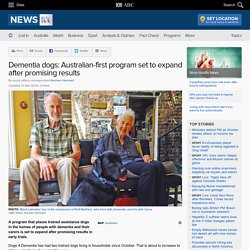
Dogs 4 Dementia has had two trained dogs living in households since October. That is about to increase to 10 households by the end of the year. The program, run by aged care provider HammondCare and Assistance Dogs Australia, is a first for Australia. According to director of HammondCare's Dementia Centre Colm Cunningham, it is already starting to have an impact. "[It's] early days. "There's a lot of stress when somebody gets dementia. "Simply that the person can recognise the dog, be involved in their care, [the family] start to remember the person with dementia is able to do things. " Dementia Guide 04cq. Promoting Emotional Health and Preventing Suicide. A Toolkit for Senior Centers.

Four Seasons care homes. Care worker scheme axed last-minute in spending review. A training scheme to create a career ladder for care workers and to address the acute shortage of nurses in care homes has been axed as a direct result of chancellor George Osborne’s spending review.

The scheme was due to start in the new year, but its backers were told last week that its £178,000 government funding was being withdrawn. Six other projects designed to boost opportunities for low-paid women workers have suffered the same fate. Cancellation of the scheme to develop the role of care practitioner has caused dismay in the struggling social care sector, where there was already widespread anger that the chancellor had greatly oversold a supposed £3.5bn package of help for the sector that he unveiled in the review.
Rocking the Ages. Emerging Themes Above:Wilma 101 years old Santa Rosa, California “My kitten hides under the covers when anyone comes into my room,” says the avid knitter and sewer, who lives at home with her daughter and son-in-law, where she works alongside her shy feline companion.
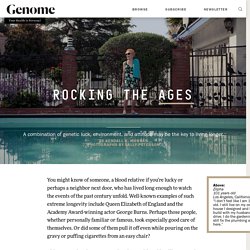
When it comes to living longer, metabolism and healthy lipid profiles in particular appear to be an important part of the equation in many cases. In Barzilai’s relatively homogeneous group of Ashkenazi Jews, those who live for a long time also often carry a beneficial version of a gene called CETP, which is tied to higher concentrations of the “good” HDL cholesterol, the kind one can get by consuming plenty of olive oil. A new study of exomes — the full sequence of protein-coding genes in the genome — of people representing three long-lived families uncovered another new longevity gene candidate. That gene, known as APOB, works together with APOE to transport cholesterol. For P. No Perfect Genome Forever Young. Getting Old = Mary Maxwell.
CLAHRC Partnership Programme. Age UK conference 2015. Care and Dementia Show 2015. Home care: delivering personal care and practical support to older people living in their own homes. This guideline covers the planning and delivery of person-centred care for older people living in their own homes (known as home care or domiciliary care).
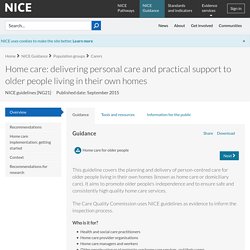
It aims to promote older people's independence and to ensure safe and consistently high quality home care services. The Care Quality Commission uses NICE guidelines as evidence to inform the inspection process. Who is it for? Health and social care practitionersHome care provider organisationsHome care managers and workersOlder people using or planning to use home care services, and their carers. Commissioners of home care services should ensure any service specifications take into account the recommendations in this guideline. Recommendations The guideline includes recommendations on: Evidence Evidence used to create this guideline Guideline development process How we develop NICE guidelines The topic overview for the NICE home care quality standard is now available. Stimulating Thinking, Writing and Discussion on what Dementia means in 2015.
Healthy diet could cut risk of Alzheimer's disease - National Library of Medicine - PubMed Health. Homeshare proposal matches young people with elderly in exchange for cooking and cleaning. Posted When 89-year-old Melbourne grandmother Barbara started falling over in her home, because of hip problems, she knew her days of living alone were over.
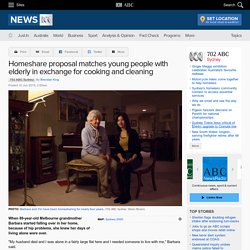
"My husband died and I was alone in a fairly large flat here and I needed someone to live with me," Barbara said. But an innovative homesharing program in Victoria that matches young people with older people put her concerns to rest. The program has been so successful, there's a proposal to start a similar program in New South Wales. Managing director of Youth Action NSW Katie Acheson said there was a large amount of housing stock in Sydney that was being under-used. Homeshare Services. Wesley recognises that most people want to live in their own homes for as long as possible, they just need a little support and companionship from a reliable and friendly person.

Wesley Homeshare matches older householders and householders with disabilities with volunteers to provide companionship and help around the home in return for free accommodation. Homeshare allows older people and people with disabilities to live independent, dignified lives within their homes and communities, by sharing their homes with people of integrity. It also provides choice and breaks down cultural and generational barriers, with many successful matches involving mature, young international students. Wesley Homeshare interviews all applicants carefully and assess need. Introductions are arranged, which aim to match potential homesharers and volunteers, through meetings and trials. Homeshare Coordinators provide ongoing contact and support to both parties throughout the match. How can and should UK society adjust to dementia?
Carol Thomas and Christine Milligan 22 June 2015 Applying the social model of disability to dementia leads to important insights and helps to explain many of the barriers in the lives of people with dementia.
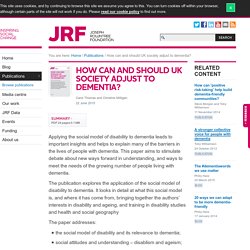
This paper aims to stimulate debate about new ways forward in understanding, and ways to meet the needs of the growing number of people living with dementia. The publication explores the application of the social model of disability to dementia. Improving communication, improving lives. My Home Life. EasyLog: staff rota, rostering and attendance software and care management systems. Open Health Care UK. Falls in older people: assessment after a fall and preventing further falls. Managing medicines in care homes. Choice in end of life care. Welcome To "Bestie Row": Lifelong Friends Build Row Of Tiny Houses In The Middle Of Nowhere. Some friendships last forever. You hear of lifelong friends often living in the same towns just so they can socialize whenever they wish, be a part of each other’s family lives, and finally grow to be the grey-haired besties who rock on the porch and talk about the “good ol’ days”.
Four couples who had been best friends for 20 years decided they were going to trump living in the same town. No way were they going to let the business of life keep them from enjoying that special connection that they’d grown to love. So they decided to literally create their own “Bestie Row.” They all were fans of the tiny house movement, and decided to build their own little compound based around that idea. Because when you can say, “We’re going to be grey-haired friends,” you know you’ve found a bond that can only strengthen.
They employed the assistance of architect Matt Garcia to make their dream come true. Via Alexander Stross They purchased land along the Llano River, just outside of Austin, Texas.